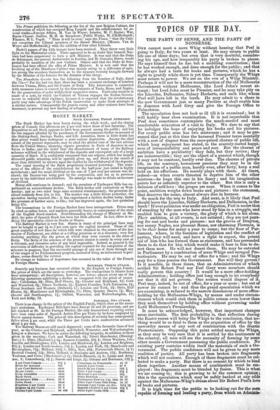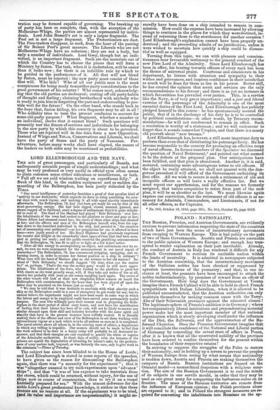TOPICS OF THE DAY.
THE PARTY OF SENSE, AND THE PARTY OF NONSENSE.
ONE cannot meet a mere Whig without hearing that Peel is
going to Italy, for two years at least. He may return to public life one of these days ; but even that is verr doubtful, consider- ing his age, and how irreparably his party is broken to pieces. He says himself that he has but a middling constitution; that he has worked enough, and done enough for the public ; and that he always had a taste for books and pictures, which he has a right to gratify while there is yet time. Consequently the Whigs must return to power. We are on the eve of a Whig Ministry. Perhaps it will not be a mere reconstruction of the old Melbourne Government without Melbourne, like Lord John's recent at- tempt; but Lord John must be Premier, and he may take pity on the Lincolns, Dalhousies, Sidney Herberts, and such like, whom Peel will have left in the lurch. He may admit to a share in the new Government just so many Peelites as shall enable him to dispense with Lord Grey and give the Foreign Office to Palmerston.
The speculation does not look so ill till it is examined ; but it
will hardly bear close examination. It is not improbable that Peel does sometimes contemplate the much-needed and most comfortable relaxation of a visit to Italy. We dare to say that he indulges the hope of enjoying his books and his pictures. For every public man has two mistresses ; and it may be pre- sumed that Just at this time the harassed Premier turns mentally with a sort of disgust from the once-prized charms of public life, which long enjoyment has staled, to the scarcely-tasted happi- ness of irresponsibility and peace and rest. But the charms of ambition have a peculiarity : they fade, but they revive they are indestructible ; they are the object of a passion which, revive; it may not be constant, hardly ever dies. The charms of private life, on the contrary, howsoever precious they may be in the imagination of a public man, hardly ever, after flirty, keep a real hold on his affections. He merely plays with them. At times, indeed—as when events threaten to deprive him of the other mistress—he hugs this one in his fancy ; and his imagination paints her as infinitely superior to the other. But this is only a delusion of self-love : the grapes are sour. When it comes to the point, ambition weighs down books and pictures : the statesman, that deserves the name, almost always dies in harness.
So much for the trip to Italy. And next, is it likely that Peel
should leave the Lincolns, Sidney Herberts, and Dalhousie's, in the lurch? If ever politician was under an obligation, Peel is under that of standing by the men who have stood by him in a struggle, and enabled him to gain a victory, the glory of which is his alone. Their ambition, at all events, is not satiated ; they are not pant- ing for rest and books and pictures : not the groves of Drayton, nor sunny Naples, nor pleasant Rome, nor charming Florence, is to be their home for many a year to come • but the floor of Par- liament, where, in the business of legislation and the conflict of parties, they will need, and have a right to expect, the potent aid of him who has formed them as statesmen, and has persuaded them to do that for him which would make it base in him to de- sert them now. He will not desert them. He may be outvoted in Parliament by a combination of mere Whigs and enraged Pro- tectionists. He may be out of office for a time; and the Whigs may for a time possess the Government. But will they govern? Is it possible in these times, that an Administration of which neither Sir Robert Peel nor Earl Grey were members should really govern this country ? It would be a mere office-holding Administration ; holding office lust long enough to let everybody see that it did not govern. One session would dispose of it. Peel may, indeed, be out of office, for a year or more ; but out of power he cannot be : and thus the grand speculation which we are examining, is reduced to the narrow dimensions of mere office- holding by the Melbourne-Whigs, by means and under circum- stances which would sink them in public esteem even lower than they sank themselves by holding office without governing under Lord Melbourne's Premiership.
It must be acknowledged, however, that important changes
seem inevitable. The first probability is, that reflection during the Easter recess will bring the Whigs to the conclusion, that no- thing would be so fatal to them as the acquisition of office by the unworthy means of any sort of combination with the frantic Protectionists. Supposing this point settled among the Whigs, as they may be very sure that it is settled by the sentiments of the country, all men will see the necessity of forming by some other means a Government possessing the public confidence. No existing party contains within itself the materials of such a Go- vernment. The public confidence will not be given to any mere coalition of parties. All party has been broken into fragments which will not coalesce. Enough of these fragments must be col- lected to make a party. But there is no cement by which to bind them together. Another means of combination must be em- ployed: the fragments must be blended by fusion. This is what we are coming to; this is growing to be the common opinion; this is the speculation which may be safely backed at any ochls against the Melbourne-Whig's dream about Sir Robert Peel's love of books and pictures. It is high time for the public to be looking out for the men capable of forming and leading a party, from which an Adminip
trataon may be formed capable of governing. The breaking- up of party has been so complete, that, with the exception of the Melbourne-Whigs, the parties are almost represented by indivi- duals. Lord John Russell's set is only a larger fragment. The Peel set is not a large fragment. The Protectionists are dust. The Free-traders disappear, as such, from the hour of the passing of Sir Robert Peel's great measure. The Liberals who are not Melbourne-Whigs have no cohesion ; they are not a body, but only a number of individuals. Lord Grey, though but an indi- vidual, is an important fragment. Such are the materials out of which the Country has to choose the pieces that will form a Ministry by fusion. The task, when it is undertaken, will be easier than it looks now ; for there is an infallible rule by which to be guided in the performance of it. All that will not blend by fusion, must be rejected : the new party must consist of those that will. Who bids ? Who of all our public men is the most , conspicuous for being ready to sacrifice party considerations to the good government of his country? Who comes next, acknowledg- ing that the old parties are destroyed; casting off old partyhabits of thought and feeling ; claiming brotherhood with anybody who is ready to join him in forgetting the past and endeavouring to pro- vide well for the future? On the other hand, who stands back in the hope that, fusion failing, his own fragment may be all in all ? Who selfishly tries to turn the present confusion to account for some old-party purpose ? What fragment, whether a number or an individual, shows that it cannot blend ? Such questions will presently test the fitness of sections and individuals for belonging to the new party by which this country is about to be governed. Those who are rejected will in due time form a new Opposition. Instead of Whigs and Tories, Conservatives and Liberals, we shall have the party of Sense and the party of Nonsense. Per- adventure, before many weeks shall have elapsed, the names of the leaders on both sides may be mentioned as probabilities.



























 Previous page
Previous page